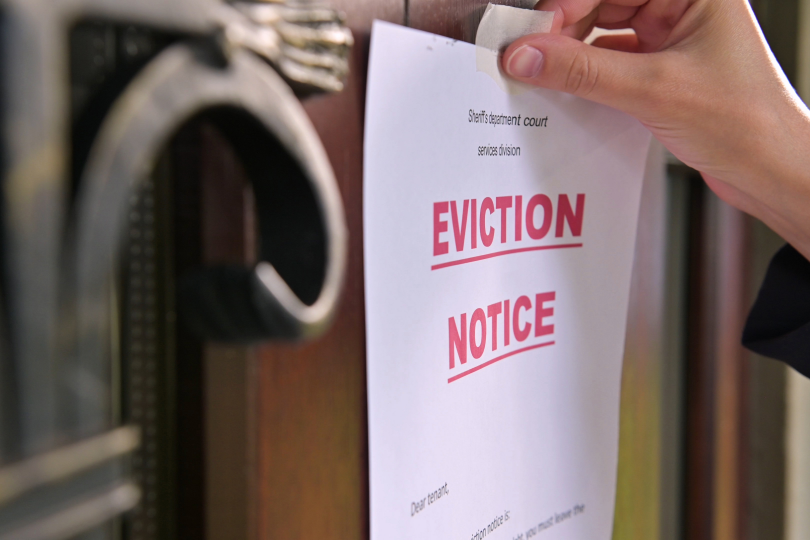In Ohio, the landscape of landlord-tenant relations is shaped by laws designed to safeguard the interests of both parties. A pivotal aspect of this relationship is the eviction process, through which a landlord seeks to reclaim their property. Drawing on over 23 years of experience as a real estate professional in Ohio, I offer a detailed exploration of eviction notice requirements, legal mandates, and practical advice to navigate these proceedings effectively and lawfully.

Ohio Eviction Notice Period
According to Section 1923.04 of the Ohio Revised Code, the eviction notice period in Ohio varies depending on the eviction’s cause. For rent arrears, a landlord must issue a three-day notice to the tenant, a critical step in informing tenants of impending eviction actions should the rent remain unpaid. The Ohio Legislative Service Commission offers a comprehensive overview of these procedures, ensuring landlords understand their legal obligations well.
Landlord Tenant Law Ohio
Ohio’s landlord-tenant law encompasses the entirety of the rental agreement, from security deposits to the termination of leases. My firsthand experience underscores the importance of understanding that following the initial notice period; landlords must proceed with an eviction lawsuit or a forcible entry and detainer action in the appropriate court should the tenant fail to remedy the situation.
Legal Eviction Notice Ohio
A legally valid eviction notice in Ohio must meticulously include the tenant’s name, the rental property’s address, the reason, and the provided notice period. As the Ohio State Bar Association outlines, these details are paramount in ensuring the eviction process’s clarity and legality, safeguarding both the landlord’s and tenant’s rights.
Eviction Process in Ohio
The judicial nature of Ohio’s eviction process requires landlords to navigate the court system, a procedure I’ve guided numerous landlords through. The Ohio Judicial Conference emphasizes that this legal pathway ensures fairness, with a court hearing allowing both parties to present their evidence. This judicial oversight is essential in upholding the eviction’s legal integrity.
Tenant Rights Ohio
Understanding tenant rights under Ohio law is crucial. Tenants are entitled to a fair eviction process, which includes receiving proper notice and the opportunity to be heard in court. These protections are in place to prevent unjust evictions and ensure landlords adhere to legal requirements.
Ohio Lease Termination
Lease termination in Ohio can occur for reasons beyond rent non-payment, such as lease term violations or choosing not to renew a month-to-month lease. These situations typically require a 30-day notice for termination, a critical detail for maintaining legal compliance and respecting tenant rights.
Notice Period for Eviction Ohio
The eviction’s cause dictates the specific notice period for eviction in Ohio. Besides the three-day notice for rent arrears, a ten-day notice is required for lease agreement violations. Familiarizing oneself with these nuances is essential for landlords and tenants to navigate Ohio rental laws successfully.
Ohio Rental Laws
Ohio’s rental laws provide a structured framework for the rental market, addressing everything from security deposit limits to abandoned property procedures. My experience has shown that a deep understanding of these laws fosters a harmonious rental relationship and minimizes legal disputes.
Termination of Tenancy Ohio
Terminating a tenancy in Ohio necessitates adherence to legal processes, including providing the correct notice period and following court procedures when required. Landlords and tenants must comprehend their legal rights and obligations to ensure a smooth termination process.
Alternative Solution: Selling to a Cash Investor

For landlords facing persistent issues with tenants or the complexities of the eviction process, selling the property to a cash investor may offer a viable solution. This approach can provide a quick and straightforward sale, eliminating the need for eviction notices and legal proceedings. As a seasoned real estate attorney, I’ve seen many clients benefit from this strategy, as it offers immediate relief from problematic rental situations and the burdens of property management.
Understanding and adhering to Ohio’s eviction notice requirements and landlord-tenant laws are paramount for navigating the eviction process effectively. However, selling to a cash investor may present a practical and beneficial option for those seeking an alternative to these legal challenges. I recommend consulting with a legal professional experienced in real estate to explore this and other solutions tailored to your specific circumstances. This approach simplifies the process and ensures compliance with state laws, helping landlords and tenants navigate their relationships confidently. Those involved in the real estate market must stay informed and consider all available options, including the potential sale of the property to a cash investor, to address their needs efficiently and effectively.
The Value of Professional Legal Advice
The complexities of Ohio’s landlord-tenant laws and the eviction process underscore the importance of professional legal advice. Whether you’re considering eviction proceedings or exploring the sale of your property to a cash investor, the guidance of a seasoned real estate attorney can be invaluable. Legal professionals can provide strategic advice, ensure compliance with all relevant laws, and help navigate the procedural nuances of the Ohio legal system. Their expertise can prevent costly mistakes and offer peace of mind during potentially stressful situations.
Conclusion
The eviction notice requirements and landlord-tenant relations in Ohio are designed to balance the rights and responsibilities of landlords and tenants. By understanding these laws and considering all options, including selling to a cash investor, stakeholders can make informed decisions that protect their interests and foster positive outcomes. As the real estate landscape evolves, staying informed and seeking expert advice will remain essential for navigating the complexities of property management and investment in Ohio.
If you’re tired of being a landlord, or do you not want to deal with problem tenants anymore? EZ Sell Homebuyers is Google’s top-ranking home cash buying team in Ohio, and it has the highest number of Google reviews. We buy houses in all Ohio cities (Dayton, Columbus, Cincinnati, Cleveland, Toledo, and Akron). Whether you are trying to avoid foreclosure, inherited a property you do not want, dealing with a divorce, or are fed up being a landlord dealing with tenants, we can help. If you need to sell your house in Ohio fast, we offer cash for homes in Ohio!
FAQ: Understanding Eviction Notice Requirements in Ohio
Q: How much notice must a landlord give a tenant before eviction in Ohio?
A: In Ohio, landlords must provide a three-day notice for non-payment of rent and a ten-day notice for lease violations before proceeding with eviction.
Q: Can a landlord evict a tenant without going to court in Ohio?
A: No, landlords in Ohio must go through the judicial process to legally evict a tenant, which includes filing an eviction lawsuit and obtaining a court order.
Q: What should be included in a legal eviction notice in Ohio?
A: A legal eviction notice in Ohio must include the tenant’s name, rental property address, reason for eviction, and the notice period given to the tenant.
Q: What are a tenant’s rights during the eviction process in Ohio?
A: Tenants in Ohio have the right to receive proper notice, contest the eviction in court, and defend themselves against eviction if they believe it is unjust.
Q: What alternatives are available to landlords facing tenant issues in Ohio?
A: Landlords facing persistent tenant issues may consider selling the property to a cash investor as an alternative to the eviction process.
Q: How can landlords and tenants learn more about their rights and responsibilities in Ohio?
A: Landlords and tenants can consult the Ohio Revised Code, seek advice from a real estate attorney, or visit official government websites for comprehensive information on their rights and responsibilities.
Q: Is professional legal advice necessary for eviction proceedings in Ohio?
A: While not mandatory, consulting with a real estate attorney experienced in Ohio’s landlord-tenant laws is highly recommended to navigate the eviction process effectively and ensure legal compliance.
